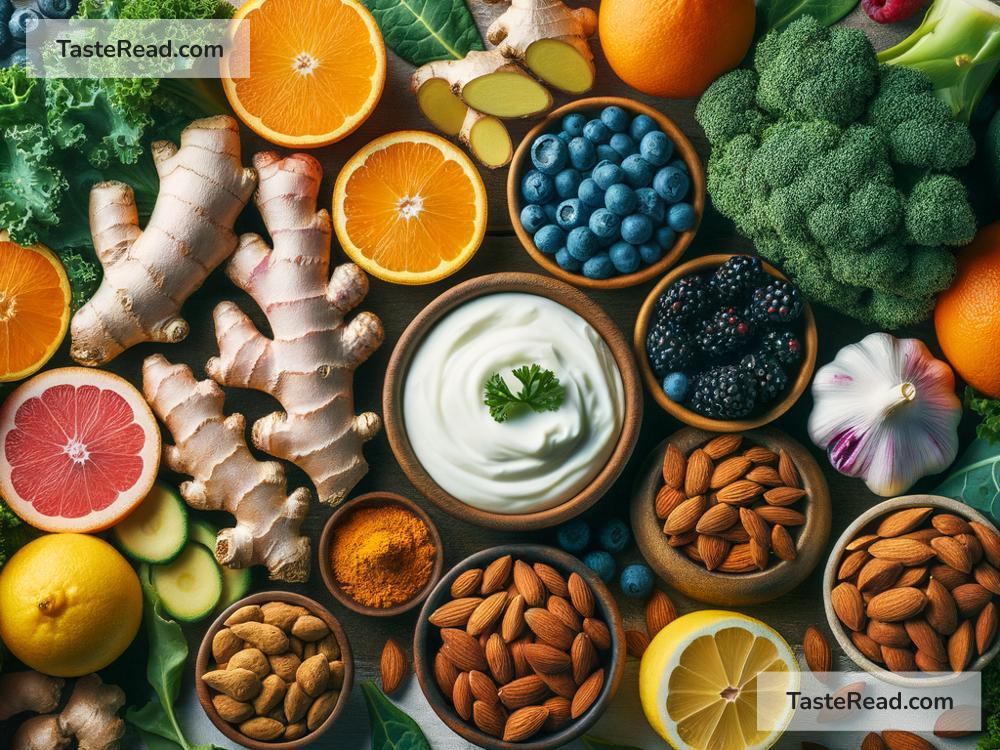Boost Your Body’s Immune Tolerance with These Foods
We’ve all heard about building a strong immune system to fight off illnesses, but have you ever heard about enhancing something called “immune tolerance”? Immune tolerance is your body’s ability to balance its immune responses, making sure it doesn’t overreact to harmless substances (like pollen or certain foods) or attack its own tissues (as in autoimmune diseases). Simply put, a well-tolerant immune system knows the difference between what to fight and what to leave alone.
Enhancing immune tolerance is especially helpful for people with allergies, autoimmune conditions, or chronic inflammation. Among the many ways to support this process, eating the right foods can make a big difference. Let’s look at some delicious, simple foods that help regulate your immune response.
1. Fermented Foods for Gut Health
Your gut is home to trillions of bacteria that play a huge role in your immune system. A healthy balance of gut bacteria helps train your immune system to behave properly. Fermented foods naturally contain probiotics, which are the “good bacteria” your gut needs.
- Examples: Yogurt, kefir, sauerkraut, kimchi, miso, and kombucha.
- How they work: Probiotics in fermented foods reduce inflammation and promote immune tolerance by helping your gut regulate immune signals.
- Pro tip: Choose fermented foods with “live and active cultures” for the best results. Avoid overly processed versions that may lose their probiotic benefits.
2. Leafy Greens
Leafy greens are a nutritional powerhouse, loaded with vitamins, minerals, and antioxidants that help calm inflammation and support immune function. They are also high in fiber, which feeds the good bacteria in your gut.
- Examples: Spinach, kale, Swiss chard, arugula, and collard greens.
- How they work: Leafy greens contain compounds like vitamin A and polyphenols that teach your immune system to tone down its response and prevent unnecessary inflammation.
- Pro tip: Mix greens into smoothies, soups, or salads daily to boost your immune tolerance.
3. Omega-3-Rich Foods
Omega-3 fatty acids are a type of healthy fat that reduce inflammation throughout your body. They also help your immune system differentiate between harmful invaders and harmless substances, promoting tolerance.
- Examples: Fatty fish (like salmon, mackerel, and sardines), chia seeds, flaxseeds, and walnuts.
- How they work: Omega-3s assist in producing anti-inflammatory compounds in your body, making it less likely for your immune system to overreact.
- Pro tip: Aim to eat fatty fish at least twice a week, or sprinkle seeds and nuts on your meals as a plant-based alternative.
4. Foods High in Vitamin D
Vitamin D is like a coach for your immune system, helping it perform calmly and efficiently. It plays a key role in regulating immune tolerance, as low vitamin D levels are linked with autoimmune diseases and allergies.
- Examples: Eggs (especially the yolks), fortified milk or cereal, and fatty fish like tuna and salmon.
- How they work: Vitamin D teaches immune cells to avoid overactive responses and unnecessary attacks on healthy tissue.
- Pro tip: Getting sunlight also helps boost your vitamin D levels. Aim for at least 15-20 minutes of sunlight exposure per day.
5. Turmeric
Turmeric is a golden-yellow spice often used in Indian and Asian cuisine, and it’s famous for its anti-inflammatory properties. Curcumin, the active compound in turmeric, helps calm your immune system and reduce harmful overreactions.
- How it works: Curcumin reduces inflammatory signals in the body, helping your immune system stay balanced and tolerant.
- Pro tip: Sprinkle turmeric on roasted veggies or add it to smoothies and soups. Pair turmeric with black pepper, as it increases curcumin absorption.
6. Berries
Berries are not just sweet and tasty—they are loaded with antioxidants that reduce inflammation and oxidative stress in the body, both of which are harmful to immune tolerance.
- Examples: Blueberries, raspberries, strawberries, and blackberries.
- How they work: Antioxidants in berries help protect immune cells and improve the immune system’s ability to respond appropriately.
- Pro tip: Eat fresh or frozen berries as a snack or on top of yogurt to combine two immune-friendly foods.
7. Ginger
Ginger is another incredible anti-inflammatory food that can help regulate immune responses. It’s especially known for its ability to calm the gut, which plays a big role in immune tolerance.
- How it works: Ginger’s compounds reduce inflammation markers and help control hyperactive immune responses.
- Pro tip: Grate fresh ginger into teas, soups, or stir-fries. Ginger pairs well with honey for an added soothing effect.
8. Nuts and Seeds
Nuts and seeds are packed with healthy fats, vitamins, and minerals that are essential for immune health. They provide antioxidants and nutrients like zinc and vitamin E that keep your immune system in check.
- Examples: Almonds, sunflower seeds, pumpkin seeds, walnuts, and chia seeds.
- How they work: Vitamin E in nuts and seeds reduces the risk of overreactive immune responses, while zinc supports immune tolerance.
- Pro tip: Snack on a handful of nuts and seeds, or sprinkle them on oatmeal or salads for crunchy goodness.
Your Immune Tolerance Menu
Improving immune tolerance is about more than just eating one or two foods—it’s about creating balance. Include a variety of these foods in your daily diet to support your gut, reduce inflammation, and teach your immune system to remain calm when it should. Combined with regular exercise, good sleep, and stress management, these foods can help you maintain a strong and balanced immune system.
Remember, food is more than just fuel—it’s medicine for your body. By nourishing your body with smart choices, you give it the tools it needs to stay healthy and resilient!


